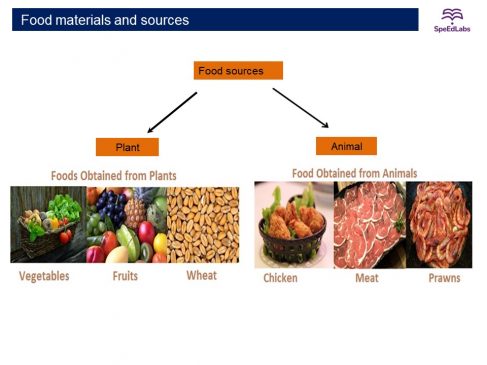
Board – CBSE
Std- 6
Topic- Components of Food
Revision Notes
- Carbohydrates, proteins, fats, vitamins and minerals are essential components of food, these components are called nutrients.
- In addition, food also contains dietary fibers and waters

Different Type of Food and their components
| Energy-giving
food |
Carbohydrates and Fats. Carbohydrates provide us instant energy. Fats are stored energy resources |
| Body-building food | Proteins are body-building food as they help in body growth and repair of damaged parts of the body. |
| Protective food | Vitamins and minerals are protective food as they protect us from many diseases. They give us resistance against disease causing germ |
Explanation
| Carbohydrates and Fats | Carbohydrates in our food are mainly sugar, starch. Starch is present in grains like rice, wheat, maize, tubers like potatoes etc. Sugar is a sweet substance. Common sugar we use is Sucrose and it is obtained from Sugar cane Fats are stored energy resources. Animal sources include milk, butter, ghee, cheese and meat and Plants resources like oil are rich resources of fats |
| Proteins | Proteins are body-building food as they help in body growth and repair of damaged parts of the body. Animal sources like eggs, fish, meat, milk, cheese and Plant sources like pulses of beans are resource of proteins Proteins are broken-down by the digestive system into amino acids (which can be absorbed into the blood). |
| Vitamins and Minerals | Vitamins are protective food as they protect us from many diseases. They give us resistance against disease causing germ Vitamins are A, B, C.D, K, E. They are obtained from Fruits, vegetables, fish liver oil, milk, eggs, Minerals are also required in small quantities. Minerals include sodium, Calcium, Potassium, iodine and phosphorous |

Carbohydrate test:

Iodine Test for Carbohydrates
Carbohydrates present in all food items are tested by Iodine test. Few drops of dilute iodine solution are added to the sample food item. If the colour changes from brown to blue-black, the presence of starch is confirmed.
Test for Proteins

Proteins in the food sample are tested by copper sulfate and caustic soda solutions. The sample food item is made into a very dilute paste and the above solutions are added to it. If the colour of the resulting solution changes to purple, the presence of protein is confirmed.
Test for Fats

Fats in the food are tested by a simple paper test. A little amount of sample food is wrapped in a paper and crushed. If the paper gets an oily patch, the presence of fat in the food is confirmed.
Vitamins: Vitamins are needed for the proper functioning of our body. They help in keeping our eyes, bones, teeth, and gums healthy. There are 13 vitamins, each of which has a specific function. Vitamins are of two types: fat-soluble and water-soluble.
Vitamins A, D, E, and K are fat-soluble vitamins. These are stored in the fat tissues of our body and are used only when the body needs them.
Our body prepares vitamin D in the presence of sunlight. Vitamins B1, B2, B3, B6, B12, and folic acid (together known as vitamin B complex) and vitamin C are water-soluble vitamins.
| Vitamin Type | Sources | Functions | Deficiency Diseases |
| Vitamin A | Leafy green vegetables, oranges, carrots, Pumpkin, Soy, Sweet potatoes | Forms and helps maintain bones, skin, tissue and teeth | Color blindness, night blindness- poor visibility at night. |
| Vitamin B1 (thiamine) | Dried herbs, sunflower seeds, whole grain cereals, sesame seeds, brown rice | Enables cells to turn carbohydrates into energy | Beriberi- loss of appetite, loss of weight. |
| Vitamin B2 (riboflavin) | Almonds, Asparagus, bananas, green beans, wheat bran, dried spices | Maintains Body growth and RBCs i.e. Red Blood Cells | Skin disorders, Cheilosis-breaking of lips |
| Vitamin B12 (cyanocobalamin) | Mutton, fish, beef, lobster, clams, eggs, oysters, crab | Helps in the maintenance of the central nervous system and RBCs | Pale skin, lack of RBC, Less stamina and less appetite. |
| Vitamin C | Fresh herbs, cauliflower, papaya, oranges, strawberries, guava | Promotes healthy gums and teeth | Scurvy i.e. gum disease (gingivitis). |
| Vitamin D | Sunshine, Mushrooms, liver, fish and eggs | Necessary for the healthy development of bones and teeth | Rickets and Osteomalacia – weakening and softening of bones. |
| Vitamin E | Soybean oil, red chilli powder, pine nuts, apricots, green olives and cooked spinach | Helps in processing vitamin K and formation of RBCs | Muscle weakness and transmission problems in nerve impulses |
| Vitamin K | Green leafy vegetables, Soybean oil. | Essential for blood coagulation | Excessive bleeding from the wound. |
Minerals: Minerals are used by the body to perform various functions like building strong bones, maintaining the heartbeat, making hormones etc. The major five minerals are Calcium, Phosphorus, Magnesium, Sodium and Potassium. Examples of mineral-rich foods include leafy vegetables, fish, beans etc.
| Mineral Type | Sources | Functions | Deficiency Disease |
| Calcium | Tofu, Dairy products, Salmon, Cabbage, Kale and Broccoli | Essential for the efficient functioning of the nervous system and healthy bones | Weak bones, lower than normal bone density and stunted growth |
| Phosphorous | Lean meats, grain and milk | Essential for the maintenance of acid-base balance in the body | Loss of appetite, bone fragility, muscle weakness, poor physique |
| Iodine | Green leafy vegetables, Seafood, iodised salt | Formation of thyroid hormone | Goitre- Enlargement of the thyroid gland, mental disability. |
| Sodium | Table salt, celery | Helps keep control on blood pressure | Nausea, irritability |
| Iron | Whole grain, eggs, leafy vegetables and meats | Essential for haemoglobin formation in RBC. | Anaemia – weakness, fatigue, shortness of breath |
What is a Balanced Diet?
A balanced diet is food intake that includes all the dietary needs of the organism in the correct proportions.
Deficiency: Sometimes simply getting adequate amounts of food might not be enough if the food does not contain the required nutrients in the right amounts. Prolonged usage of such nutrient-less food may result in a condition known as Deficiency.
Deficiency Diseases: Diseases that occur from the lack of an element in the diet, usually a particular vitamin or mineral are known as deficiency diseases.
- A diet lacking proteins may result in skin diseases, stunted growth, diarrhoea, swelling of the face and discoloration of hair.
- A diet deficient in both carbohydrates and protein may hinder the growth completely and the person becomes so frail and lean that he or she might not even be able to move.
- Deficiency of certain vitamins and minerals can cause diseases like scurvy, goitre, anaemia etc. as mentioned in the tables above.
Hence one must always make sure to include all the nutrients in their food and drink a good amount of water to maintain a healthy body that is free from diseases.
Malnutrition
Improper intake of nutrient-rich food may lead to another condition called malnutrition or undernutrition. Without adequate intake of food, our bones become brittle, our muscles weaken and our thinking becomes foggy. In such situations, our bodies are said to become malnourished.
When there is a lack of protein in our bodies, repair of wounds and an injury becomes difficult. When this is combined with an inadequate intake of calories, it leads to a condition known as Protein-energy Undernutrition or malnutrition.
There are two ways in which protein-energy malnutrition manifests itself:

Two types of protein-energy malnutrition diseases
Kwashiorkor: People with severe protein deficiency are often at high risk of developing this disease. People in rural areas are more likely to suffer from this disease, as there is a lack of protein rich food. If one often indulges in diets that are high in carbohydrates and low on protein it can lead to them showing symptoms of kwashiorkor i.e. Edema (puffy appearance due to retention of fluid), inability to gain weight and bulging of abdomen.
Marasmus: Children and young adults are more likely to develop this disease. If there is inadequate intake of both energy and protein, it tends to manifest as marasmus. Chronic diarrhoea, weight loss, dehydration and stomach shrinkage are the major symptoms of marasmus.

